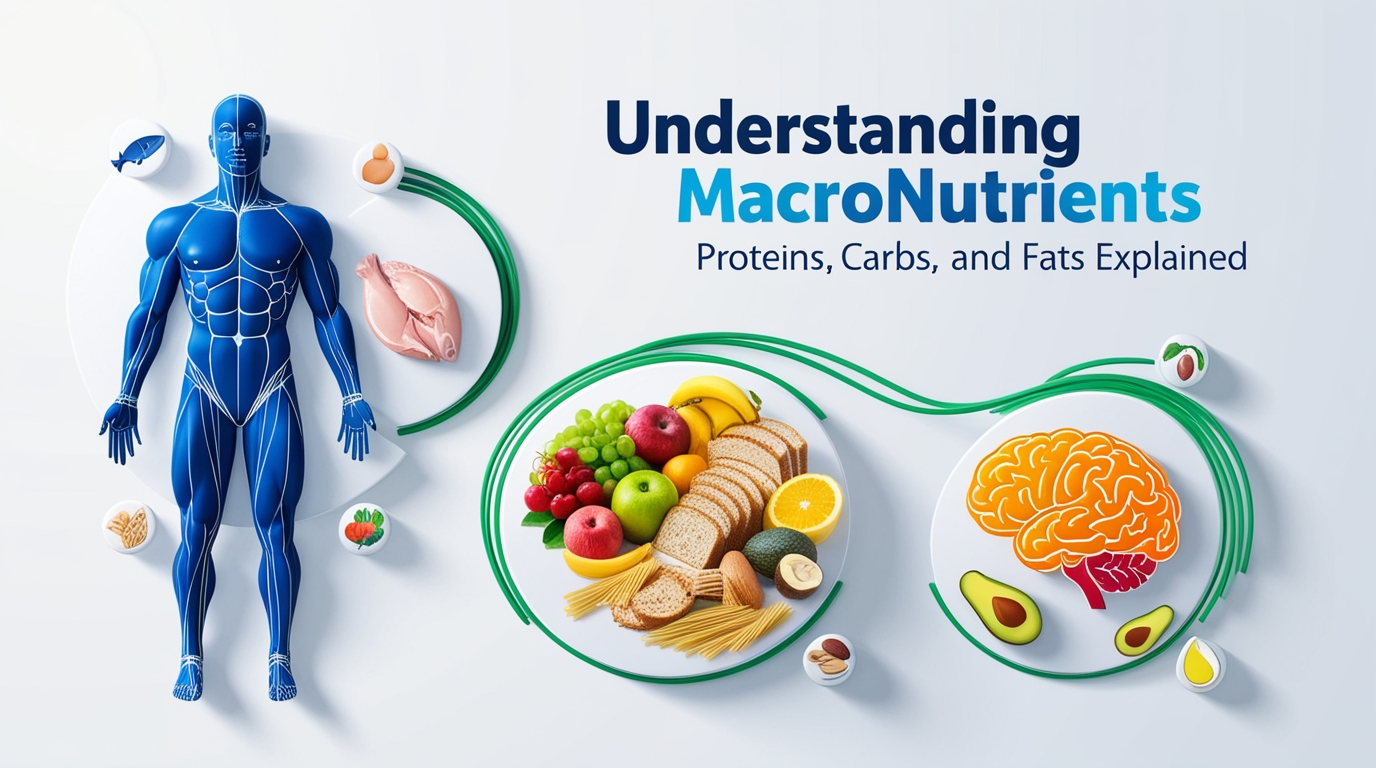What fuels your body, powers your workouts, and keeps your mind sharp? In the world of nutrition, macronutrients like proteins, carbohydrates, and fats are the secret ingredients to a vibrant, energetic life. But what exactly do these nutrients do, and how do we understand that they transform your diet? Are you curious about which foods help you build muscle, sustain energy, or support your immune system? To know more about this information, Join us on an exciting journey to explore the roles of each macronutrient, where to find them in your meals, and how to strike the perfect balance for a healthier, more energetic you! The adventure into nutrition begins now!
Let’s break down each macronutrient, what it does, where to find it, and how to balance them.If you want a macronutrient rich diet plans click here.
What Are Macronutrients?
Macronutrients are nutrients that provide energy and support our bodies. Unlike vitamins and minerals, which we need in smaller amounts, we need macronutrients in larger quantities. Each type has its own important role.
Proteins: Building Blocks of the Body
What They Do?
Proteins help build and repair tissues. They are also important for making hormones and supporting your immune system. Proteins are made up of amino acids, some of which we must get from food.
Where to Find Them?
Good sources of protein include:
- Animal-based: Meat, fish, eggs, and dairy.
- Plant-based: Beans, lentils, nuts, and whole grains.
How Much You Need?
Aim for proteins to make up about 10-35% of your daily calories. If you’re active or trying to build muscle, you may need more protein.
Tips to Add More Protein–
- Include protein in every meal.
- Choose lean meats and plant proteins to stay healthy.
- Snack on Greek yogurt, nuts, or protein bars.
Carbohydrates: Your Body’s Fuel
What They Do?
Carbohydrates are the ultimate source of energy for our body and brain. They are basically of two types: simple and complex.
- Simple Carbs: Quick energy sources found in fruits and some dairy products.
- Complex Carbs: Provide lasting energy and are found in whole grains, beans, and vegetables.
Where to Find Them?
Carbs can be found in:
- Fruits (like bananas and apples)
- Vegetables (like potatoes and corn)
- Grains (like bread, rice, and pasta)
- Legumes (like lentils and chickpeas)
How Much You Need?
Aim for carbohydrates to make up about 45-65% of your daily calories. concentrate on whole grains and rich fiber foods.
Tips for Healthy Carbs-
- Choose whole grains instead of white bread.
- Eat a variety of fruits and vegetables.
- Limit sugary snacks and processed foods.
Fats: Important for Health
What They Do?
Fats are essential for energy, hormone production, and absorbing certain nutrients. They also protect your organs and help keep your cells healthy.
Types of Fats:
- Saturated Fats: usually found in animal products and some of the oils. They should be eaten in moderation.
- Unsaturated Fats: Healthier fats are found in fish, nuts, seeds, and avocados. They are good for your heart.
- Trans Fats: Unhealthy fats are found in many processed foods; these should be avoided.
Where to Find Them?
Healthy fats come from:
- Olive oil, avocados, and nuts (like almonds and walnuts)
- Fatty fish (like salmon)
- Seeds (like chia and flaxseeds)
How Much You Need?
Fats should make up about 20-35% of your daily calories. Focus on eating more unsaturated fats while limiting saturated and trans fats.
Tips for Healthy Fats-
- For cooking, use olive oil which is better than butter.
- Snack on nuts instead of chips.
- Include fatty fish in your meals a couple of times a week.
Finding the Right Balance
The best balance of macronutrients varies from person to person. It depends on age, gender, activity level, and health goals. A good rule of thumb is to fill your plate with:
- A source of lean protein
- Lots of colorful vegetables
- Whole grains or conservative vegetables
- A healthy fat source
Paying attention to your hunger and fullness can also help you adjust your macronutrient input.
Conclusion
In the above, as you understand macronutrients like proteins, carbohydrates, and fats are essential for making healthy food choices. By including a variety of nutrient-rich foods and balancing your macronutrient intake, you can create a diet that supports your health and energy.
Remember!! Everyone is different, so find what works best for you and Your body will appreciate it!





